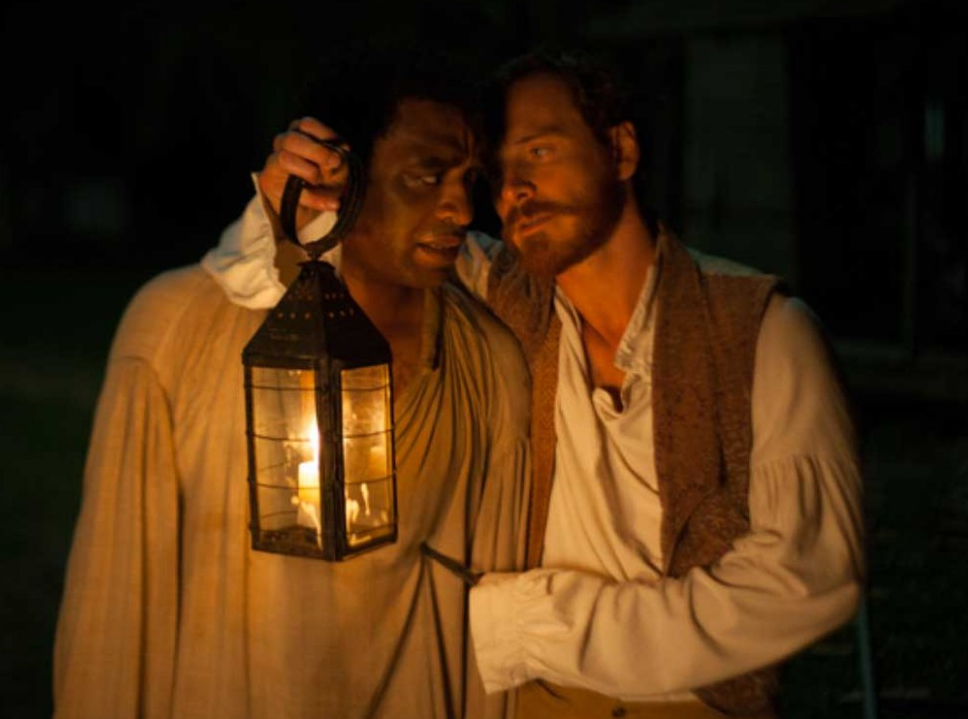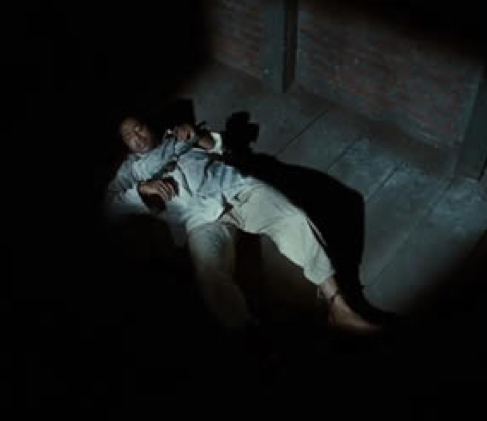The New York Film Festival (Sept. 27-Oct 14) is in its last few days; here's JA's thoughts on Steve McQueen's 12 Years a Slave.

The free man turned slave Solomon Northrup's been sent on a trip to the grocer by the mistress of the plantation. He's to get something or other. He walks down the dirt path dutifully... until he doesn't - he darts into the woods, quickly, making pains to not be seen. His brow bursts with sweat. He dodges around trees, through vines, and he runs, and runs. We've been waiting for this moment, for his nerve to snap, for the surrounding wilderness to swallow him up and carry him back to his family up North.
If only freedom were that simple. No, simplicity belongs to the other side here. Evil comes easy. Around every corner, behind every hedgerow, a hangman. A crowd surrounding two black men, strung up. There is to be no escape - just a trip to the grocer, picking up something or other, or else. The two black men yank up into the air furiously, twitching to death, and so Solomon moves on, which is all he can do - that, or hang, twitching to death in the strange surrounding wilderness of this nowhere nothing place where he doesn't belong.
But then it's not quite a nowhere nothing place, though the plantations are all rendered as any muddy backyard anyplace, thick with moss and turned-soil stretching out - it's a specific time, and a specific place, and a specific horror where Solomon Northrup finds himself imprisoned. And to say he doesn't belong implies that anyone there does - that his birthright on one side of a line drawn on a map renders him different from the souls he now stands and suffers beside. 12 Years a Slave knows better and muddies up every distinction - freedom's just a word, its meaning rendered by the person who says it or doesn't say it, so easily snuffed out in a world built upon institutionalized indifference laid over bottomless cruelty. To say one man's a little bit better than another only seems to mean he'll push the problem, you being the problem, off on someone else - you're gonna hang either way.
 To say that Steve McQueen's film renders the unfathomable brutality of this period in our history tangible in a way that I've never seen captured on-screen before is both an understatement (for one it makes the cavalier jokiness of Tarantino's Django Unchained seem terrifically misguided, to put it nicely, in retrospect) and a bit of a side-step - it does that but it somehow, miraculously, does so through inclusivity. This is not a film that pushes you away, even as it renders you breathless by its terror. We become one with Solomon. That's on Chiwetel Ejiofor's flawless and open performance of course, but also McQueen's direction and John Ridley's script, which never feel the need to force us any which way but to what's suddenly, inescapably, right in front of us. The commonness of the horror, the ease of it - it's all just so simple here, the way you can turn a corner and find freedom replaced by a sack over your head and your toes scratching at the mud, as you gasp for one last strangled breath.
To say that Steve McQueen's film renders the unfathomable brutality of this period in our history tangible in a way that I've never seen captured on-screen before is both an understatement (for one it makes the cavalier jokiness of Tarantino's Django Unchained seem terrifically misguided, to put it nicely, in retrospect) and a bit of a side-step - it does that but it somehow, miraculously, does so through inclusivity. This is not a film that pushes you away, even as it renders you breathless by its terror. We become one with Solomon. That's on Chiwetel Ejiofor's flawless and open performance of course, but also McQueen's direction and John Ridley's script, which never feel the need to force us any which way but to what's suddenly, inescapably, right in front of us. The commonness of the horror, the ease of it - it's all just so simple here, the way you can turn a corner and find freedom replaced by a sack over your head and your toes scratching at the mud, as you gasp for one last strangled breath.
The scars, by the way, never go away. The ghosts neither. We might crumple into the arms of the people who love us, or we might crumple into the dirt a battered rag doll of a person, but we're all gonna fall. It's as graceless as it is inevitable. It is what comes after that means to survive. And then, after that too. And always, the after, that's all there is, stretching scarred out towards infinity, and falling some more.